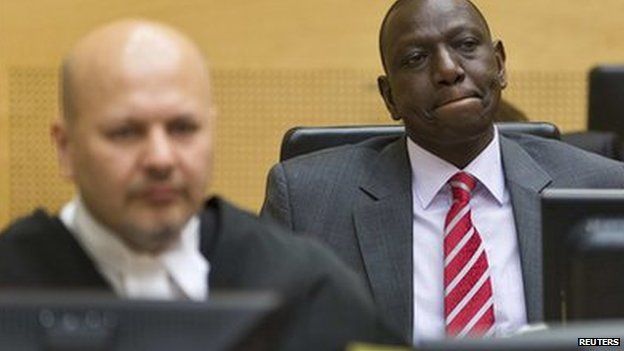ICC summons reluctant Kenyan witnesses in Ruto trial
- Published

The International Criminal Court (ICC) in The Hague has summoned reluctant witnesses to testify at the trial of Kenya's Vice-President William Ruto.
It said the Kenyan government had an obligation to serve ICC subpoenas on the eight witnesses.
Mr Ruto denies charges of organising ethnic violence after the 2007 election in which some 1,200 people died.
The withdrawal of witnesses has affected several other ICC cases related to the Kenya poll violence.
Mr Ruto is currently the most senior serving government official to be tried by the ICC.
Last year, charges were dropped against Kenya's former civil service head Francis Muthaura as some witnesses were too frightened to testify and another witness had recanted his testimony, the ICC said at the time.
Kenya's President Uhuru Kenyatta is also due to stand trial - he too denies the allegations of orchestrating the post-poll conflict in which 600,000 people were displaced.
His trial had been delayed until October to allow the prosecution to collect more evidence following the loss of two key witnesses.
Mr Ruto is on trial alongside Joshua arap Sanga, who as head of a Kalenjin-language radio station is accused of whipping up ethnic hatred in the aftermath of the election - a charge he denies.
In a statement, the ICC said on Thursday that, according to the prosecution, the "eight witnesses are now no longer co-operating or have informed the prosecution that they are no longer willing to testify".
It said the witnesses could appear by video-link to testify and asked Kenya's government "to make appropriate arrangements for the security of the eight witnesses until they appear before the court".
Mr Ruto and Mr Kenyatta were on opposite sides of the 2007 election, but formed an alliance for the 2013 election that propelled them to power.
The Kenyan government - backed by the African Union (AU) - has pushed for the cases to be dropped.
- Published13 September 2022
- Published5 December 2014
- Published10 September 2013
- Published17 October 2013
- Published12 October 2013
- Published7 January 2015
- Published25 June 2015
- Published27 November 2017